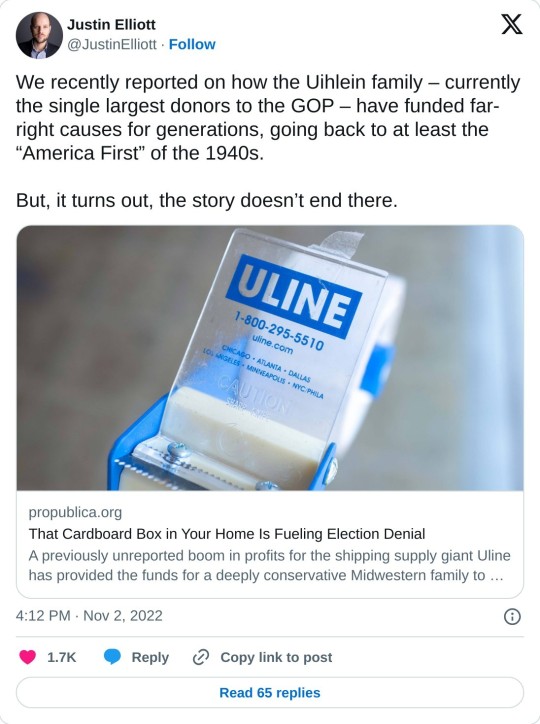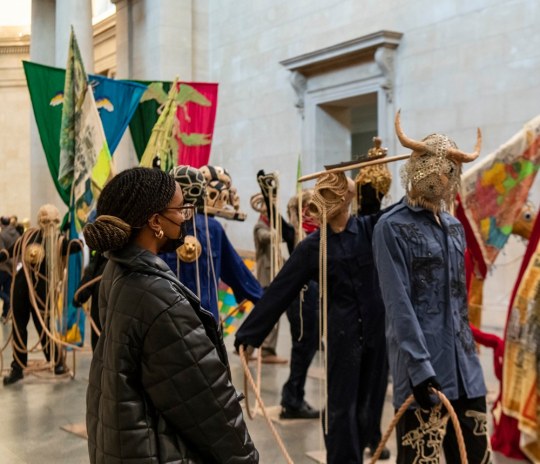#Finance Magnates
Explore tagged Tumblr posts
Text
matt levine namedropped on Elspeth season 2 episode 10 "finance bros"
#where one identical twin finance magnate kills another when he turns to a life of poverty and charity works#played by alan ruck
53 notes
·
View notes
Photo

Environmental Concerns and Bitcoin: Exploring Eco-Friendly Solutions The meteoric rise of Bitcoin and other cryptocurrencies has fascinated the financial world and beyond. However, as cryptocurrencies' popularity has grown, so have concerns about their environmental impact. The energy-intensive process of Bitcoin mining has sparked concerns about its impact on carbon emissions and environmental deterioration. In this in-depth article, we look at the environmental concerns surrounding Bitcoin, the variables that contribute to its carbon footprint, and the inventive solutions being pursued to make cryptocurrency mining more environmentally friendly.Cryptocurrency Mining's Carbon FootprintCryptocurrency mining, the process of creating new coins and verifying transactions, is based on sophisticated mathematical calculations performed by powerful computers. This method necessitates a significant amount of computer power, resulting in high energy usage. As a result, the carbon footprint of cryptocurrency mining has been scrutinized.Factors Influencing Energy ConsumptionSeveral factors contribute to cryptocurrency mining's high energy consumption:PoW (Proof-of-Work) Bitcoin and many other cryptocurrencies use the PoW consensus method, in which miners compete to solve complicated mathematical puzzles. This necessitates massive amounts of computer power, which consumes enormous amounts of energy.Mining Hardware: Using specialized hardware, such as Application-Specific Integrated Circuits (ASICs), consumes more energy. These machines are geared for mining, but they also consume a lot of power.Mining Pools: To boost their chances of successfully mining a block, miners frequently join forces in mining pools. While this improves efficiency, the combined computational power increases energy consumption.Geographical Distribution: The location of mining operations is important. Cheap electricity, frequently produced from nonrenewable sources, attracts miners but contributes to a larger carbon footprint.Integration of Renewable EnergyThe use of renewable energy sources has gained traction as a solution to the environmental challenges related with bitcoin mining. Renewable energy, such as solar, wind, and hydroelectric power, provides a more environmentally friendly way to power mining operations. Some cryptocurrency miners are shifting their operations to places with ample renewable energy in order to lessen their carbon impact while retaining profitability.Proof-of-Stake (PoS) InnovationsPoS, an alternate consensus process, has developed as a more environmentally friendly choice than PoW. Unlike PoW, PoS does not necessitate miners solving complicated riddles. Instead, validators are chosen based on the number of coins they own and are ready to "stake" as collateral. Because it eliminates the need for resource-intensive computations, this method dramatically reduces energy use.Mining Equipment that Saves EnergyEfforts are being made to create more energy-efficient mining equipment. Some businesses are looking at using graphics processing units (GPUs) instead of power-hungry ASICs. GPUs, which are widely used in gaming and have a lower energy footprint, have the potential to make mining more sustainable.Initiatives for Carbon Offset and SustainabilitySome cryptocurrency initiatives are taking proactive measures to reduce their carbon footprint. They accomplish this by investing in environmental projects or acquiring carbon credits equal to their emissions. These initiatives seek to mitigate the negative environmental impact of their operations.Initiatives Led by the CommunityThe cryptocurrency community is also pushing for environmentally friendly alternatives. Discussions regarding lowering energy consumption and shifting to PoS techniques are becoming more popular. Miners and fans can exchange ideas and work on sustainable mining techniques through online forums and social media platforms.Accountability and Regulations by the GovernmentGrowing environmental concerns have generated ideas about governmental measures to ensure responsible cryptocurrency mining. Governments are looking for measures to encourage miners to use renewable energy sources or to impose energy usage caps.Balancing Responsibility and InnovationAs the bitcoin landscape evolves, it is critical to strike a balance between innovation and environmental responsibility. While cryptocurrencies have the potential to change economics and encourage technological growth, they must not come at the expense of the well-being of the world. The pursuit of environmentally friendly solutions is an important step toward ensuring that the benefits of cryptocurrencies do not jeopardize environmental sustainability.Ethereum's Energy-Efficient Upgrade: A Game Changer for BlockchainAfter much anticipation, Ethereum, a leading cryptocurrency, has successfully implemented a groundbreaking network upgrade, transitioning from a proof-of-work system to proof-of-stake. This transformation has had a significant environmental impact, reducing Ethereum's energy consumption by over 99%.The move towards a proof-of-stake model is in response to growing criticism of the cryptocurrency industry's substantial energy usage. In contrast, Bitcoin, Ethereum's counterpart, is maintaining its proof-of-work system. In this system, highly specialized computers engage in a competitive process to validate transactions and generate new coins, a process commonly known as mining.Notably, the energy-intensive process of mining Bitcoin consumed 75.4 terawatt hours in 2020, surpassing the electricity consumption of entire countries like Austria or Portugal. Ethereum's shift from mining to validation represents a significant shift in its energy consumption model. Validators, responsible for verifying transactions, are rewarded with ether coins for their efforts.To ensure the integrity of the validation process, validators are required to make a security deposit by staking a specified quantity of ether coins within the network. If a validator attempts to compromise the network's security, they risk losing their stake. Ethereum proponents argue that this penalty mechanism enhances the network's security.Bitcoin enthusiasts, however, continue to support the proof-of-work system, viewing it as a tried-and-tested approach to securing the network. Nonetheless, Bitcoin faces mounting scrutiny due to its energy consumption, particularly amidst global climate concerns. Consequently, some prominent Bitcoin miners are turning to renewable energy sources for their operations and attempting to reframe Bitcoin's energy use as a positive force, attracting investments to the aging national power grid.ConclusionThe environmental concerns raised by Bitcoin and cryptocurrency mining highlight the complicated relationship between technology, economics, and the environment. As cryptocurrencies become more widely accepted, the sector is being forced to find innovative and long-term solutions to lessen its carbon footprint. Various paths are being studied, ranging from renewable energy integration to consensus process advances. In a world increasingly concerned with environmental well-being, the convergence of technological ingenuity with environmental consciousness will be critical in determining the future of cryptocurrencies. This article was written by Pedro Ferreira at www.financemagnates.com. https://www.financemagnates.com/cryptocurrency/environmental-concerns-and-bitcoin-exploring-eco-friendly-solutions/
1 note
·
View note
Text
A far-right activist group that is doxxing college students who engage in pro-Palestinian protests revealed that it is funded by top Republican political donors and nonprofits backed by wealthy business leaders, a tax return reviewed by CNBC shows.
The group, Accuracy in Media, publicly disclosed on its federal tax return a list of donors who combined to contribute nearly $1.9 million to the tax-exempt nonprofit between May 2022 and April of last year.
The contributors listed on the tax return include billionaire Republican megadonor Jeff Yass, who Accuracy in Media said gave it $1 million.
The family foundation of shipping supply magnate Richard Uihlein is also identified on the tax return, which says the Ed Uihlein Family Foundation gave $10,000. The Milstein Family Foundation, which is run by real estate executive and Republican donor Adam Milstein, gave another $10,000, the group reported to the IRS.
According to its tax return, Accuracy in Media said it received $15,000 from the Coors brewing family’s charitable foundation. The Adolph Coors Foundation is chaired by former Molson Coors executive Peter H. Coors, according to the foundation’s latest tax records.
Yass, Uihlein, Milstein and Coors have all donated regularly to Republican campaigns over the past decade.
But Yass stands apart from the others. The co-founder of options trading powerhouse Susquehanna International Group and his wife Janine are the biggest political donors of the 2024 election. So far, Yass and his wife have contributed $70 million to dozens of Republican candidates and committees, according to the nonpartisan campaign finance database OpenSecrets.

Much of the cardboard and paper goods strewn about our homes — the mail-order boxes and grocery store bags — are sold by a single private company, with its name, Uline, stamped on the bottom. Few Americans know that a multibillion-dollar fortune made on those ubiquitous products is now fueling election deniers and other far-right candidates across the country.
Dick and Liz Uihlein of Illinois are the largest contributors to Pennsylvania gubernatorial candidate Doug Mastriano, who attended the Jan. 6 rally and was linked to a prominent antisemite, and have given to Jim Marchant, the Nevada Secretary of State nominee who says he opposed the certification of Joe Biden’s election victory in 2020. They are major funders to groups spreading election falsehoods, including Restoration of America, which, according to an internal document obtained by ProPublica, aims to “get on God’s side of the issues and stay there” and “punish leftists.”
111 notes
·
View notes
Text
In mid-January, Brad Schimel, a Wisconsin circuit-court judge running for an open seat on the state Supreme Court, flew to Washington to attend Donald Trump’s Inauguration. Schimel, a former attorney general under Republican Governor Scott Walker, told the Milwaukee Journal Sentinel that he wanted to spend “quality time with a ton of Wisconsin voters.” Three days later, Elon Musk wrote on X that, because the liberal majority on the Wisconsin Supreme Court had reversed a ban on absentee-ballot drop boxes last year, it was “very important to vote Republican for the Wisconsin Supreme Court to prevent voting fraud.” (There is no evidence that drop boxes lead to voter fraud.) Schimel, who, if elected, would give conservatives a majority on the court, began dropping hints that he could use more of Musk’s help. “Elon Musk noticed this race a week and a half ago or so,” he said during a G.O.P. event in early February. “I don’t know if he’s found his checkbook, though.”
Since then, Musk has given more than twenty million dollars to organizations supporting Schimel’s election. The race, already the most expensive judicial election in American history, is likely to cost a hundred million dollars, according to the Wisconsin Democracy Campaign, a nonpartisan campaign-finance watchdog. The previous record—fifty-one million dollars—was set in 2023, when Janet Protasiewicz won a seat on the Wisconsin Supreme Court, giving liberals a majority for the first time in living memory. Schimel’s opponent is Susan Crawford, a Dane County circuit judge who served as the chief legal counsel for Democratic Governor Jim Doyle, Walker’s predecessor. After Doyle left office, Crawford entered private practice, taking on a variety of progressive clients, including Planned Parenthood and the Madison teachers’ union. Both candidates are taking money from prominent billionaires, including George Soros (who has donated two million dollars to groups supporting Crawford) and Richard Uihlein, the right-wing shipping magnate (who has given nearly six million dollars to groups trying to elect Schimel). Musk’s contributions, however, have exceeded those of all the other billionaire contributors combined.
The state’s Supreme Court elections are only nominally nonpartisan—the outcome, after all, will decide the future of abortion rights, labor rights, and voting rights in the state—but there is still an expectation that candidates avoid blatant political bias. During the campaign, Schimel has said that, if elected, he would treat Trump as any other litigant. But his political loyalties have been clear for years. As attorney general, Schimel aggressively defended Walker’s attacks on labor rights, voting rights, and abortion, and the 2011 redistricting maps, which were drafted in secret at the behest of Republican legislative leaders and produced one of the most extreme partisan gerrymanders in the country. (Schimel once described himself as Walker’s “bag man.”) Last Halloween, he dressed up as Trump and, more recently, he posed below a giant Trump inflatable at a Mega MAGA rally in Waukesha County. Earlier this month, he spoke at an event headlined by Donald Trump, Jr., and Charlie Kirk, whose super PAC, Turning Point USA, is actively supporting Schimel’s campaign. Schimel has also said that Trump was “screwed over” by the Wisconsin Supreme Court after the 2020 election. (By a single vote, the court rejected Trump’s lawsuit to throw out more than two hundred thousand ballots from the two largest and most Democratic counties in the state.) This month, Trump officially endorsed Schimel and held a “tele-town-hall” for him. (Schimel did not respond to requests to be interviewed.)
The election, in a pivotal swing state and the only statewide race in the country before November, is widely seen as a crucial test for the growing backlash against Trump and Musk’s agenda, which has so far included dismantling the federal government, threatening judges, and abducting legal residents. “This race is now a proxy battle for whether the American government at every level can be bought by oligarchs,” Ben Wikler, the chair of the Wisconsin Democratic Party, told me. “Either Democrats are back and the fight is on, or the Republican Musk-Trump colossus can come in and just flick people out of their way when they decide to put down their big bucks.”
Musk has a personal stake in the outcome, too. Last year, his car company, Tesla, filed an application with the Wisconsin Department of Transportation to open four dealerships in the state. The request was denied owing to a state law that bars car manufacturers from selling directly to consumers. A week before Musk first posted about the race, Tesla filed a suit challenging the law. If the case reaches the Wisconsin Supreme Court, Schimel would not be required to recuse himself. In 2009, the state’s largest business lobby, along with the Wisconsin Realtors Association, drafted the court’s recusal rules, which were adopted, verbatim, by the conservative-controlled court. They explicitly state that judges are not obligated to recuse themselves from cases involving a campaign contributor.
In support of Crawford’s campaign, Wikler has launched a multi-platform effort called the People v. Musk, which has included TV ads, billboards, and town halls where citizens are invited to air their grievances about the world’s richest man, who, as the head of Trump’s Department of Government Efficiency, or DOGE, is aggressively gutting the federal workforce. At the first event, in Waukesha, a woman held back tears as she described the prospect of losing her job at the Department of Veterans Affairs; a postal worker with twenty-eight years on the job worried that, if Trump and Musk succeed in their plans to privatize the agency, he would lose his retirement.
“Eighty per cent of our canvassing interactions are about Musk,” Matt Mareno, the chair of the Waukesha County Democratic Party, told me. The county is heavily Republican, but Mareno said that many people have expressed frustration that Musk is unelected and not accountable to anyone. Recently, a canvasser for Schimel carrying literature from Musk’s America PAC showed up at Mareno’s door. Mareno has a large Susan Crawford campaign sign in his yard. “He had no idea who Susan Crawford was,” Mareno told me. “I said, ‘So, like, you don’t know who’s running against your boy Brad?’ ” The canvasser didn’t. He had been flown in from Texas and was being put up at a hotel and paid twenty-five dollars an hour. (Turning Point USA is paying canvassers for Schimel even more—two hundred and fifty dollars a day.) “They’re using the sledgehammer approach,” Mareno said. “If you can write a twenty-million-dollar check and bring people in to hit every door, then you can do whatever you want, and it works because of scale.” (Neither America PAC nor Turning Point USA returned requests for comment.)
Mareno, who helps organize the Democratic canvassing operations for the county, expects to deploy about six hundred canvassers—all of them unpaid volunteers—during the final weekend of the campaign, about ten times the normal amount for a spring election. “The thing that makes me feel good is our energy,” he said. “I’ve never seen it this high for a spring race before. At the same time, we’ve never seen this level of money coming on the other side.”
The flow of money into Schimel’s campaign was made possible by the destruction of Wisconsin’s once robust campaign-finance laws. Those laws grew out of the state’s progressive tradition, which sought to restrain the power of wealth in the political system. The movement was spearheaded by Robert (Fighting Bob) La Follette, who served, at various times, as Wisconsin’s governor, a U.S. senator, and a third-party candidate for President. Under La Follette, Wisconsin became the country’s premier “laboratory of democracy,” passing major reforms to protect labor and the environment and to promote clean and transparent government. By 1911, Wisconsin had banned corporations from donating to candidates, set strict limits on spending, and barred politicians from trading favors for donations. The state’s reputation for clean government deepened in the nineteen-seventies, when it passed further reforms that included public financing of elections.
But in 2010 the U.S. Supreme Court issued Citizens United v. Federal Election Commission, a sweeping decision that struck down limits on independent election spending by corporations and ushered in the era of the super PAC. Wisconsin Republicans took it upon themselves to dismantle state-level campaign-finance restrictions. Schimel, as the state’s attorney general, supported the effort. A criminal investigation led by the Milwaukee district attorney had allegedly found, among other things, that Walker’s campaign illegally coördinated with dark-money groups in the run-up to a 2012 recall election, which Walker narrowly won. Individuals involved in the dark-money groups, who were later supported by the attorney general’s office, brought a lawsuit challenging the investigation, and arguing that such coördination should be permitted on First Amendment grounds. In 2015, the court agreed with the plaintiffs, in a 4–2 decision, and killed the investigation, retroactively legalizing coördination. Schimel applauded the ruling. “The assertive recognition of First Amendment rights by the Wisconsin Supreme Court protects free speech for all Wisconsinites,” he said.
In an unusual move, the court also ordered the prosecutors to destroy more than a thousand documents that they had gathered as evidence. But some of them were first leaked to the Guardian, showing what appeared to be quid-pro-quo payments to dark-money groups, including seven hundred and fifty thousand dollars paid by the owner of a company that had manufactured lead paint in exchange for legislation granting legal immunity from lead-poisoning claims. Schimel ordered an investigation to find out who leaked the documents. Meanwhile, he declined to investigate a conservative plaintiff who intentionally violated a gag order by speaking to the Wall Street Journal.
The court’s ruling prompted the Wisconsin legislature to gut the state’s campaign-finance laws. Permissible donations for statewide offices doubled, from ten thousand to twenty thousand. More significantly, the legislature removed limits on donations to political parties, political-action committees, and legislative campaign committees. Political parties were allowed to give as much as they wanted to candidates. “It has become a shell game here,” Matt Rothschild, the former executive director of the Wisconsin Democracy Campaign, told me. “Why even have a twenty-thousand-dollar donation limit to a candidate when you can give twenty million dollars, like Musk is doing, to outside groups?”
Since 2019, the state Democratic Party, with Wikler as its chair, has consistently outpaced Republicans in fund-raising, drawing enormous contributions from wealthy out-of-state donors. Democratic-backed candidates have won nine of the past twelve statewide races. However, two of the most important recent elections went Republican: the 2022 Senate race and the 2024 Presidential race. Rothschild, who advocates against out-of-control spending, regardless of party, believes the recent Democratic winning streak needs to be put in perspective. “There are more rich billionaires on the right—and they have more money,” Rothschild said. “Elon Musk is proving that right now. It wasn’t a game that we could continually win.”
The first Musk-funded ads attacking Crawford mistakenly used a photo of a different Susan Crawford, something of a metaphor for Musk’s ignorance of the state. In a recent debate, Crawford called her opponent “Elon Schimel,” and she has noted how Musk is energizing her base. “Once he got involved, I think that really lit a fire under people,” she told me. “People do not like to see Elon Musk walking into a state judicial race and basically trying to buy a seat on a state Supreme Court.”
A day after Trump’s endorsement, Schimel joined Musk and Senator Ron Johnson for a chat streamed on X. If the Republicans win the race, Johnson said, “we have to thank Elon for all the support he’s given.” The Wall Street Journal reported that Musk is planning to expand his state-based efforts by getting involved in local elections in Nevada, where he has clashed with a county commission over a tunneling project. The Journal noted that other battleground states, including Arizona and Georgia, are clamoring for him to get involved in their races, too. Last week, Musk announced that America PAC will be offering a hundred dollars to any registered Wisconsin voter who signs a petition “in opposition to activist judges,” a reprise of an offer he made to Pennsylvania voters during the 2024 Presidential election. This past Wednesday, he awarded a million dollars to one of the petition’s signers, with the promise of more million-dollar prizes to come. “It’s corrupt, it’s extreme, and it’s disgraceful to our state and judiciary,” a Crawford spokesperson said in a statement.
Two days later, Musk announced that he would hold a rally in Wisconsin for registered voters and “personally hand over” one-million-dollar checks to two people who have already cast their ballots. (Early voting began March 18th.) “Conditioning entry to this event and eligibility for the $1 million payout on whether someone has voted arguably violates Wisconsin law, which prohibits providing anything of value to induce a person to vote,” Brendan Fischer, a campaign finance expert at Documented, a nonpartisan watchdog, told me. Musk quickly deleted the original tweet and posted on X that the rally would now be open to anyone who signed his petition and that the million-dollar checks would be given to two attendees “to be spokesmen for the petition.”
If Crawford wins, it may be because of unlikely supporters like Josann Reynolds, a retired circuit-court judge who was appointed by Scott Walker. Reynolds worked in the same building as Crawford. “I am not unfriendly with Susan, but we’re not friends,” she told me. “I never shared a meal with her and never had a one-on-one phone call.” But she has respect for Crawford as a jurist. “She’s smart, she’s hardworking,” Reynolds said. “I believe that her temperament, her intellect, and her experience all bode well for her to be on our Supreme Court.”
Last month, Reynolds returned from a trip to Mexico and was shocked to be greeted by a barrage of ads characterizing Crawford as “catch-and-release Crawford.” The ads slammed Crawford’s sentencing of a child-sex offender to four years in prison as too lenient and blamed her for the fact that he lived near a school after being released. Reynolds noted that the Wisconsin Department of Corrections is responsible for where released prisoners live after they serve their sentences; judges have no control over it. “I had never heard about ‘catch-and-release Crawford,’ ” Reynolds told me. “It did not exist before Elon Musk and others began contributing a lot of money to this race.” (And the state Supreme Court does not impose criminal sentences.) His involvement has heightened her fear over the ongoing attacks on judges. “It’s all very alarming,” she said. “And the most alarming part is, if you don’t toe the line, they’re coming for you. And their resources are enormous.”
15 notes
·
View notes
Text
hat figure includes funding from January 2023 and November 2024 for political donations, lobbying and advertising to support elected officials and specific policies. Because it does not include money funneled through dark-money groups – which do not have to reveal their donors – it is almost certainly a vast understatement, says the report from green advocacy group Climate Power, which is based on campaign finance disclosures and advertising industry data.
Fossil fuel interests poured $96m into Donald Trump’s re-election campaign and affiliated political action committees, the report found. Much of that was covered by megadonor oil billionaires, such as the fracking magnate Harold Hamm, the pipeline mogul Kelcy Warren and the drilling tycoon Jeffery Hildebrand.
Additional contributions came from lesser-known oil and gas interests, including fossil fuel-trading hedge funds, mining corporations and the producers of offshore-drilling ships and fuel tanks.
Fossil fuel companies and their trade groups spent another $243m lobbying Congress. Those donors stand to profit from priorities set by Senate-confirmed Trump cabinet appointees, such Chris Wright, the fracking CEO who was tapped to head the Department of Energy, and Lee Zeldin, the former New York representative who has accepted more than $400,000 in fossil fuel-tied campaign donations and who will lead the Environmental Protection Agency.
13 notes
·
View notes
Text

THINKING ABOUT… 𝐆𝐎𝐉𝐎 𝐁𝐄𝐈𝐍𝐆 𝐘𝐎𝐔𝐑 𝐁𝐎𝐒𝐒
You were the assistant to a well-known magnate in Tokyo. You've seen the man on magazines, both as a big-shot business lord and as the wet dream of women all over Japan. When you decided to study business and finance, you never thought you would land an important job in a prestigious company. Sure, you had dreams and what no, but never actually thought you would be accepted as anything more than just another 9-5 office employee. But despite the great salary and the luxuries that surrounded you, the heir to the Gojo clan made it impossible to like your job. He represented everything you loathe in a man; Satoru Gojo is condescending, self-centered, a playboy, and is not ashamed to flaunt his money. He makes sure to annoy you whenever the opportunity present itself, like complaining when you bring him a coffee from his favorite café claiming that “you don’t know how to order it” knowing you use the exact words he gave you. To your experience, he’s insufferable, it’s why you don’t understand why your heart fires up when he looks at you with those majestic eyes for more than a few seconds, or why your hands get clammy at the thought of being stuck in his family private jet when you have to accompany him in a business trip. Even when you went to sleep, flashes of the white-haired man invaded your nights, dreaming about his fingers caressing your body, getting on his knees like you are a goddess worthy of being worshiped, gawking at you like he might get punished for not taking in your essence. And when you wake up at deadly hours of the morning, you might even wish it wasn’t a dream.
#i wanted to make this long but idk what else to write#gojo satoru#jujutsu kaisen#gojo satoru x reader#jjk fanfic#unrevised#unedited#un-everything
45 notes
·
View notes
Text
The fascist party was one of the first to be financed by the largest industrialist in Germany, Hugo Stinnes. In the period from 1924 to 1927, the Hitlerite party was already supported by a number of major concerns and banks. At that time, the party was financed by the metal industrialist Ernst Borsig, the manufacturer Edwin Bechstein and the head of the Deutsche Bank Emil Kirdorf and others. Starting from 1928, the aces of heavy industry, the Gelsenkirchen concern, the capital magnates Fritz Thyssen, Albert Vögler, the Krupps (Gustav and Alfred Krupp) and others, have been especially strenuously supplying the fascist party with money. Thus, the fascist German party, as they say, was nurtured from birth, nourished and raised by the German secret police and the German imperialists. This party was bought in the bud by the German imperialist bourgeoisie. The whole gang, all these “Führers” and Führerlings, starting with Hitler himself, are people who sold themselves entirely to the imperialists, their faithful dogs and obedient servants unquestioningly fulfilling the will of their masters – the largest bankers, industrialists and landowners of Germany. These “masters” dreamed of military revenge, dreamed of the seizure and plunder of all countries.
The fact that the Hitlerite party is the party of the largest imperialist predators and the worst enemies of socialism is quite eloquently told by the capitalists themselves. The well-known tycoon of German predatory capital, the owner of the largest metallurgical concern in the Ruhr, Thyssen, says in his letter published in America to the New York Times on June 9, 1940, “For several years, during which I had the opportunity to observe the Hitler regime as a state adviser and industrial leader, I realized with increasing clarity what a grave mistake I made in the summer of 1932 when, together with Krupp, Kirdorf, Schroeder and others who subsidized the National Socialist Party, I took upon myself, so to speak, the guaranteed responsibility for Hitler’s good behavior towards Germany and the whole world and helped him to come to power.” The “socialist” Hitler, along with his entire party, were bought by Thyssen, Krupp, Kirdorf, Schroeder and others. And Thyssen speaks about this with all frankness in the above letter.
In 1932, Hitler spoke at the Industrialists’ Club in Düsseldorf in front of the Ruhr capitalists’ meeting. Before his masters, Hitler spoke frankly, without the usual hysteria of antics and playing at socialism. This is what he told them then: “You, gentlemen, stand on the point of view that the German national economy can be restored exclusively on the basis of private property. But you can only keep the idea of private property if it is logically justified. This idea must be morally grounded. It is necessary to prove to the masses that private property is inherent in the very nature of things. It would be wrong to conclude that we National Socialists are against capitalism. On the contrary, if we were not there, there would be no bourgeoisie in Germany.” Needless to say, Hitler was frank with his masters. And here he is, indeed, right. The Nazis are not against capitalism. They are the real servants of the imperialists. But why do they still call themselves socialists? Hitler gave an answer to this question to his imperialist masters as well. They are called socialists in order to be able to deceive the people. “Do not deprive people of hope,” Hitler said at the same meeting, “for a better future. On the contrary, inflate it. After all, the garrison of the besieged fortress fights only as long as he hopes that he will receive help from somewhere.”
Who are the National Socialists? Pavel Yudin, 1942
27 notes
·
View notes
Note
OMG OMG ISRA AND HAWK LORE PLEASE?? and thank you <3
Thank you for the ask!!! This is going to be a post for Isra, I'll post Hawk separately.
Hope you enjoy!
Isra Lore + Fun Facts
(May contain spoilers for Death by Mixer)

Ok to begin with, let's talk about Isra's family.
His family is anything but average. Isra's full name is Isra Rausin. His father is an oil magnate that comes from old money, his mother was a rising star runway model, but had to quit once she got pregnant with their first child. Isra has an older sister. They have about a 9 year gap between them.
She wants nothing to do with their father, running off to go to film school in California when she was 19. She is now a successful director, using the stage name "Dallas Heaven", and only visits her family to see Isra.
Dallas is quite affectionate towards her younger brother, but Isra approaches her with contempt, seeing her as a traitor to the family.
Now that we got the surface level information on the Rausin family out of the way, let's talk about the less public side.
Although officially the Rausins deal in oil that isn't the full extent of their business. They also have heavy ties with illegal practices such as drug and human trafficking.
That is the main reason Dallas tried to distance herself, but she still ended up being hooked back into the business once she became a director. Isra, on the other hand, never even thought about disobeying his father.
Now it's time to talk about Isra's childhood.
It's safe to say that it wasn't easy. His mother hung herself when Isra was a toddler, barely able to speak, because she could not stomach her husband cheating on her with every single housemaid they employed.
Despite that Isra was a lively, happy kid, at least up until his sister ran off to pursue a life among stars. That incident was the boiling point for their already cruel father. From that point on the head maid of the house was ordered to punish Isra for any minor fault with whipping.
The old head maid was used to dishing out cruel punishments to children as the father of the house often ordered her to punish Dallas by depriving her of food and water.
She continued to carry out Isra's punishments and he quietly endured them until his thirteenth birthday. That day when he was once again dragged off for a whipping he snapped and killed the old maid by crushing her wrinkly neck with his bear hands.
Despite what you might expect, Isra wasn't punished for this, in fact, he was rewarded. The day he first killed was the day when his father first saw Isra as his son.
After that Isra was sent off to Sweden for school while Rausin Senior dealt with covering up the murder. Isra quickly became popular in his new boarding school. He has a silver tongue and a certain aloof charm about him. He graduated a year early and entered university, soon earning a bachelors degree in finance and returning to his family home to learn the ins and outs of the family business.
He still visits Sweden a few times a year to retreat to his very own luxurious cottage in the Alps. Such a quiet place away from prying eyes is perfect for all kinds of fun...
Ok now it's time for fun-fact-rapid-fire-round-up!
Isra is not a natural blonde, he gets his hair done every month.
He showers + washes his hair twice a day always finishing the shower off by wiping himself down with rubbing alcohol and moisturising.
He wears make-up. A little bit of lightweight foundation, tinted eyebrow gel, mascara and a tinted lip balm.
He washes (or if he can't - disinfects) his hands every hour.
He loves alcohol, his favourite drink is whiskey aged at least 15 years.
If he is going out to eat or drink to a place he is not familiar with he will bring his own silverware.
His philosophy is that the body and mind can only either be born pure or be truly purified through pain.
He is incredibly classist, he sees anyone poorer than he is as filthy.
I love all my children equally but good god do I hate Isra.
15 notes
·
View notes
Text
After Donald Trump won this month’s election, one of the first things he did was to name two unelected male plutocrats, Elon Musk and Vivek Ramaswamy, to run a new Department of Government Efficiency. The yet-to-be-created entity’s acronym, DOGE, is something of a joke—a reference to a cryptocurrency named for an internet meme involving a Shiba Inu. But its appointed task of reorganizing the federal bureaucracy and slashing its spending heralds a new political arrangement in Washington: a broligarchy, in which tremendous power is flowing to tech and finance magnates, some of whom appear indifferent or even overtly hostile to democratic tradition.
Fuck these asshats! There's way more power in tens of millions of people.
5 notes
·
View notes
Text
Chapter 15? Not much work is done this chapter but lots of progress is made!
They stop at Phaya's house. Tharn doesn't understand why such a rich guy is a cop. His dad is some kind of finance magnate and his mom is of royal blood. The family has lots of impressive cars and Tharn wants to check them out but Phaya tells him it can wait until morning. Tharn wants to greet his parents but Phaya tells him that can wait until morning too.
In Phaya's room, Tharn notices medals and certificates. He studied in France and raced cars. No wonder he drives like a maniac. Phaya tells him he can just ask instead of reading the certificates. Tharn says he can speak English but gets that Phaya wants to tell the story so let's him. Calls him golden boy and asks for his school stories. He was a bad boy drinking and sleeping around and doing drugs. Phaya and his friends were tricked into dealing drugs and one was shot and killed. Tharn is shocked because it's not in his record. He assumes Phaya's father made it hush hush. Phaya says he didn't get along well with his dad. That he joined the Air Force to make him angry but it turns out he enjoyed it.
He wants to know more about Tharn. He says he became a cop because his dad was a cop before he became a monk. That he gave it up because of him. His parents visited a temple before he was born and were told he should be born in Nong Kai because he's a river son and that he should stay close to the river. If he didn't he would die within a year. They didn't believe it and took him home to Chaing Mai. Within three months his heart stopped beating and they used the charm they were given to bring him back. They returned and his dad became a monk to extend his life. His mom returned to Chaing Mai but wouldn't say why no matter how much he asked. He became a cop to find the person who shot and killed his dad.
Phaya hugs him and Tharn tries to pull away. Tharn starts to blush. So Phaya offers to help him shower. Tharn spits out the water he was drinking. Phaya says he can't get his hand wet so he'll need help showering. Tharn insists he doesn't need help so Phaya says his bathroom is large and they can do whatever they want in it. Phaya asks why he's shy they showered together many times during training. And then offers to help undress Tharn. Tharn refuses and locks himself in the bathroom. If he's scared of being turned on.
Except Phaya comes strolling in naked. And Phaya remarks that Tharn isn't lacking in the size department. Tharn tries to go take a bath instead but Phaya insists on them showering together. He grabs the injured hand to make sure it stays dry and pulls Tharn closer. Phaya starts touching his chest and Tharn blushes more. And notes that their groins are nearly touching. Tharn says he doesn't want to shower anymore and tries to push Phaya away. Phaya asks what he's scared of. Tharn tries to turn away and Phaya pushes him against the shower wall. Phaya is touching his "sensual core" and he can't resist returning his kisses. Phaya growls and starts giving him a hickey. Tharn is about to call out Phaya's name when he's kissed again. Their sweat is now mingling with the water from the shower. The kiss breaks apart as they both are close. Or as the author puts it: soon after, the bodies felt like floating on air, splashing love point into that steely hand.
As they catch their breath, Tharn asks what kind of friends do this. Phaya jokes he had a friend like this in France. Tharn doesn't think he's funny. Phaya kisses his forehead and says he did this because he doesn't want to be friends anymore. Tharn thinks Phaya still likes Nong Dao but Phaya tells him.ahe doesn't love him and he doesn't love her anymore. Tharn insists Phaya doesn't like men like this. Phaya thought he told him already that he has slept with me but guesses he forgot. He tells Tharn before it was lust but with him it's love. Tharn calls him a jerk and Phaya offers another one round. Tharn turns him down so they get ready for bed.
Just as Phaya is about to sleep he hears a familiar voice say let's go out to talk shall we? Before Phaya could answer he feels pulled away. It's Chalotorn in Tharn's room or a room just like it. He tells Phaya to stop messing with Tharn. Phaya taunts him that he's friends with Tharn and maybe more than friends already. Chalotorn says that Phaya knows so well how she felt about him and that Vanvisa may have told him all of it. And that he has learned other past stories. That in every live Vassarat must meet her death because of Phaya and Phaya still thinks he deserves the love she gives? Phaya didn't realize that Vassarat dies in every life for him. Chalotorn realizes that Vanvisa couldn't come tell Phaya more. Phaya demands to know what he did to her but Chalotorn doesn't answer.
Chalotorn decides to show Phaya a montage of their former lives and how Tharn/Vassarat always dies indirectly because of him. No matter what shape or form Tharn always dies for Phaya. Chalotorn says: see it with your own eyes and take it into consideration if you still merit her love! Someone like you doesn't deserve it at all. I'll take my woman back and no one can stop me! (bitch she was never your woman? you spurned her for her sister?)
Phaya wakes in his own bed tossing and turning to notice Tharn turn away from the commotion. Phaya is unable to sleep after what he was shown so he watches Tharn sleep all night. Tharn wakes up and wants to meet Phaya's family but they've left for the day already. they have breakfast and leave for work. Phaya asks Tharn if he loves him and Tharn says it's been a long time already since he's been in love with Phaya. Phaya asks Tarn to let him take care of him from now on. Tharn starts crying and Phaya slams on the breaks. Tharn says they are tears of joy. Phaya leans over and kisses his forehead and Tharn tells him to keep driving.
Phaya tells him he's been in love for a while as well and asks Tharn to be his boyfriend. Tharn thinks it's too easy and Phaya says it wasn't easy for long enough so they should make it easy now. Tharn agrees. Phaya holds his hand and says thank you swearing he will never let Tharn go and wouldn't let anyone steal him again.
They arrive at the office. Yai asks how Tharn is. It's announced they got the case from last night and the captain will be in soon. The person who was murdered was a student of the artist Waipoj. The woman from the night before was the deceased's mother. She used to teach martial arts. Both are waiting to be interrogated. The captain splits everyone into teams. Phaya and Tharn are sent to get an update from forensics. The victim had been dead for 51 hours and had lots of defensive wounds on his body. He had a nail in his skull that caused a fracture and brain bleed leading to a lack of oxygen. There were also signs of strangulation. And a large bruise on his hand showing he fought back. There's lots of fingerprints, hair, and footstep traces at the crime scene.
Singh is interrogating Waipoj. He swears he's innocent. Singh shows him evidence of the stolen artwork that he took from the victim and sold under his own name. There were many things used to cover the smell of the body and eyewitnesses that the two had met before the exhibition. Singh is convinced Waipoj is involved somehow.
16 notes
·
View notes
Text
𝑬𝑳𝑬𝑨𝑵𝑶𝑹 𝑴𝑰𝑵𝑨𝑹𝑰 𝑾𝑨𝒀𝑵𝑬: 𝑻𝑯𝑬 𝑾𝑨𝒀𝑵𝑬 𝑯𝑬𝑰𝑹𝑬𝑺𝑺 𝑾𝑯𝑶 𝑹𝑬𝑾𝑹𝑰𝑻𝑬𝑺 𝑯𝑬𝑹 𝑶𝑾𝑵 𝑹𝑼𝑳𝑬𝑺 Published in The Goodway Gazette





There are many names that carry weight, and then there is Eleanor Minari Wayne—a name that doesn’t just turn heads, but leaves an impression long after she’s walked away. At 27, she is the reigning force behind Seraphine & Noire, a brand that has taken luxury fashion and turned it into something more than just clothing. It is presence, it is attitude, it is a quiet power—just like the woman who built it.
The Wayne family name is built on a dynasty of men—business magnates, industry leaders, political players, and visionaries. Eleanor is the exception. The youngest and only daughter in a house of sons, she was never the loudest voice in the room. She never had to be. While her brothers made their marks in finance, tech, and international affairs, Eleanor carved out a space of her own, one that didn’t rely on the weight of the Wayne name to be taken seriously.
Even from a young age, Eleanor had an eye for detail, an instinct for power moves, and a sharp mind that worked five steps ahead of everyone else. She was never just another heiress; she was a strategist, a visionary, and a girl who knew that the world doesn’t hand success to you—you take it. And so she did.
Three diplomas before the age of 21. One in Business, another in Fashion, and a third in Strategic Management. A portfolio of early investments that turned profitable before she could legally drink. A reputation as the business school heartthrob who walked into classes dressed like she was ready for a board meeting but carried herself like she had nothing to prove. And now, CEO of a brand that has the luxury world at its feet.
Her debut into fashion was nothing short of cinematic. Seraphine & Noire’s first collection wasn’t just an introduction; it was a statement. Minimalist, powerful, and undeniably elegant, the pieces weren’t loud—but they were impossible to ignore. The fashion industry took notice. Critics called it a “lesson in modern opulence.” Investors called it “a brand built to last.” The world called it the future.
And Eleanor? She didn’t call it anything. She simply smiled, sipped her espresso, and moved on to the next thing.
She is charm without effort, sharp wit wrapped in silk, and ambition that doesn’t ask for permission. She doesn’t chase trends; she dictates them. While others build brands, Eleanor builds legacies. And she does it all while making it look effortless.
Her likes? Power dressing. A perfectly tailored coat. Espresso over lattes. Midnight brainstorming sessions. Long drives in classic cars. Art that makes you think. Silence that makes people uncomfortable.
Her dislikes? Over-explaining. Mediocrity. People who mistake kindness for weakness. Anything loud just for the sake of being loud. Trends that die too quickly. And, above all, being underestimated.
Some people spend their lives trying to prove themselves. Eleanor Minari Wayne never had to. She walks into rooms with the quiet assurance of someone who already knows she belongs there. And if she doesn’t? Well, she’ll simply build a new room altogether.
Seraphine & Noire is just the beginning. Eleanor Wayne isn’t just here to play the game—she’s here to change it.

#Spotify#tumblr rp#active rp#original rp#oc#ocs#oc rp#original character#my ocs#rp#new rp#roleplay#ask blog#ic#rp blog#oc roleplay#roleplay blog#rp finder#crossover rp#suits#gossip girl#blair waldorf#serena van der woodsen#nate archibald#dan humphrey#chuck bass#marvel rp#mcu rp#mcu roleplay#marvel oc rp
2 notes
·
View notes
Text











"What I try to do in my work is mix ideas of attraction and ideas of discomfort – colourful and attractive, but strangely, scarily surreal at the same time". - Hew Locke
Hew Locke: The Procession, Installation in the Tate Britain, 2023.
"The Procession invites visitors to ‘reflect on the cycles of history, and the ebb and flow of cultures, people and finance and power.’ Tate Britain’s founder was art lover and sugar refining magnate Henry Tate. In the installation, Locke says he ‘makes links with the historical after-effects of the sugar business, almost drawing out of the walls of the building,’ also revisiting his artistic journey so far, including for example work with statues, share certificates, cardboard, rising sea levels, Carnival, and the military.
Throughout, visitors will see figures who travel through space and time. Here, they carry historical and cultural baggage, from evidence of global financial and violent colonial control embellished on their clothes and banners, alongside powerful images of some of the disappearing colonial architecture of Locke’s childhood in Guyana. The installation takes inspiration from real events and histories but overall, the figures invite us to walk alongside them, into an enlarged vision of an imagined future."
32 notes
·
View notes
Text
Zach Despart at Texas Tribune:
BEAUMONT — Texas House Speaker Dade Phelan, the top electoral target for a far-right faction of Republicans intent on controlling the Legislature, emerged victorious Tuesday over a well-funded challenger endorsed by Donald Trump and his allies.
Phelan defeated former Orange County Republican Party chairman David Covey, who also had the backing of Lt. Gov. Dan Patrick, Attorney General Ken Paxton and former Texas Republican Party Chairman Matt Rinaldi. In doing so, he avoided the ignominious fate of becoming the first House speaker to lose a primary in 52 years. With all precincts reporting, Phelan was up 366 votes — within the margin that Covey can call for a recount. Covey, however, conceded in a speech to supporters at his election night party in Orange shortly after 9:30 p.m. Phelan, 48, who has seen his popularity plummet among Republicans since he backed the impeachment of Paxton on corruption and bribery charges exactly one year and one day ago, was defiant in his victory speech at JW’s Patio in Beaumont. “I will be your state rep for HD 21 and I will be your speaker for the Texas House in 2025,” Phelan said to a raucous crowd of more than 100 supporters. “This was a true grassroots effort — not the fake grassroots.”
Covey, a 34-year-old first-time candidate, not only forced Phelan into a runoff in March but secured more votes than the two-term House speaker. That outcome shocked many in the district, as Phelan was previously reelected four times without Republican opposition and hails from one of the most prominent families in Beaumont. Candidates for the Texas Legislature who trail after the first round rarely win their runoffs. Phelan carried the unique advantage of being a statewide leader with a prolific roster of political donors. Through May 20, his campaign reported spending $3.8 million on the runoff, more than double Covey’s $1.6 million. Their combined hauls amounted to what was almost certainly the most expensive state House race in Texas history. It was also an ugly contest — Phelan accused Covey of running on “lies and deceit” — where the candidates attacked each other in a flood of mailers and television advertisements.
[...] Phelan’s win is a major blow to the party’s ultraconservative faction that is led ideologically by Patrick and Paxton and financed by megadonors like West Texas oil magnate Tim Dunn. It is a group that rejects compromise and bipartisanship, demonizing Democrats and the Republicans willing to work with them. This ascendant wing has supplanted the party’s traditional focus on taxes and regulations with highly divisive social issues like transgender rights and book bans. In defeat, that group did not go quietly. Covey called Phelan an "Austin swamp creature" who only secured reelection through the support of Democrats, which he said was a "brazen act of betrayal." Paxton, an early endorser of Covey who had campaigned for the challenger as late as Tuesday afternoon, echoed the claim. The attorney general, who had vowed revenge against Phelan for supporting his impeachment, said the speaker had "blatantly stolen an election from the hard-working people of his district" by courting Democrats. Paxton said Republicans should move to closed primaries — a priority of the far right — and he issued a warning to members of the House.
[...] But whether Phelan can hold on to the speaker’s gavel is unclear. One of his own committee chairmen, Republican Rep. Tom Oliverson of Cypress, declared his candidacy for speaker in March. But no members have publicly endorsed Oliverson, and while his reelection was in doubt, Phelan was able to keep the rest of his caucus from open rebellion. [...] Attacked by his enemies as a RINO, Phelan was also widely considered more conservative than his predecessors, Phelan secured passage of the state’s near-total ban on abortion, permitless carry of handguns and several first-in-the-nation border security bills. Phelan was easily reelected speaker in January 2023 with all Democrats and almost all Republicans in support; conservative rumblings of dissatisfaction amounted to a paltry three votes for another candidate. And he batted away far-right criticism of the House’s longstanding practice of appointing Democratic committee chairs, appointing them to lead eight of 34 committees.
Texas House Speaker Dade Phelan (R) staves off MAGA wing/Farris Wilks/Tim Dunn-funded candidate David Covey to narrowly keep his seat and his Speakership gavel.
#Dade Phelan#David Covey#Texas#Farris Wilks#Tim Dunn#Ken Paxton#Dan Patrick#Donald Trump#2024 Texas Elections#Texas House of Representatives#2024 Elections
6 notes
·
View notes
Text



Political Power
Along with economic power goes political power. Firstly, there is the power over working people. 70% of agricultural workers live in tied cottages. Landowners also play an important role in local politics, often having a totally disproportionate share of local council seats. Though they are less than 10% of MPs in the House of Commons, they dominate in the House of Lords. They also appear in a whole range of other capacities: National Park Boards, Countryside Commissions and Nature Conservancy. The political influence of landowners can be seen even more clearly in the farming and forestry lobbies. The main lobbies include the Country Landowners Association (CLA). Most of the CLA’s work is done within ‘the old boy’s network’. To succeed, the CLA doesn’t have to do anything but just stop anyone else from changing the status quo. Examples include removing of taxes on profit-taking, abolition of security for tenants as well as many features (e.g. trespass) of the Criminal Justice Act. There are whole aspects of land owning power that we know nothing about because of the secrecy surrounding information on who owns what. There is no open public land registry, for instance. This secrecy gives enormous power. Rural landowners own many urban properties and have control over the major primary industries that form the basis of any economy. In addition, many landowners are also industrialists or financiers or both. This is not just a matter of high finance, with banks investing in land, media magnates buying up Highland estates etc, but because of the ideological and cultural role that the landowners play in maintaining the coherence of the ruling class.
#anarcho-communism#anarcho-primitivism#anti-capitalism#capitalism#class#class struggle#climate crisis#colonialism#deep ecology#ecology#global warming#green#Green anarchism#imperialism#industrialization#industrial revolution#industrial society#industry#mutual aid#overpopulation#poverty#social ecology#anarchism#anarchy#anarchist society#practical anarchy#practical anarchism#resistance#autonomy#revolution
2 notes
·
View notes
Text

⊹₊⟡⋆ kaya scodelario + she/her ⊹₊⟡⋆ blasting back in black by ac/dc through their airpods is FREYA RIBEIRO . oh , you don’t know them ? they’re the thirty2 year old executive ( pr agent & ceo of her own boutique agency ) who just went viral for verbally eviscerating the paparazzi and successfully stopping a barrage of negative press for a very high profile client . yup , the one that drives a bmw m8 competition convertible . i hear they’re pretty +incisive , but others have claimed that they’re quite -acerbic . that makes sense , considering they’re often labeled as the non-idle rich .
[ ✰ ] WANTED & ESTABLISHED CONNECTIONS ( WIP ).
penned by HECATE ( she/her , 21+ , pst )

001. ↻ BASICS .
[ ✰ ] full name: freya ribeiro st. clair
[ ✰ ] alias / nickname(s): freya ribeiro
[ ✰ ] age: 32
[ ✰ ] date of birth: 01/15
[ ✰ ] place of birth: rio de janeiro, brazil
[ ✰ ] ethnicity: white, brazilian
[ ✰ ] nationality: american, british ( formerly )
[ ✰ ] gender: cis woman
[ ✰ ] pronouns: she/her
[ ✰ ] orientation: bisexual / biromantic
[ ✰ ] language(s) spoken: english, italian, brazilian portuguese, spanish
[ ✰ ] mbti: ENTP
[ ✰ ] element: water
[ ✰ ] zodiac: capricorn
[ ✰ ] character inspiration: nanami kento ( jujutsu kaisen ), will mcavoy ( newsroom ), olivia pope ( scandal ), jessica pearson ( suits ), shiv roy ( succession )
002. ↻ BACKGROUND .
NOTE: this is a quick summary / tldr of freya's background . for a more detailed bio , please CLICK HERE !
( tw: mentions of familial death & infidelity ) freya ribeiro st. clair was born into a life of massive wealth and influence in rio de janeiro . the product of two powerful families: the ribeiros , known for their booming liquor business , and the st. clairs , a family of finance magnates and media moguls . freya’s life was shaped by high societal expectations , all while navigating the somewhat complex dynamic with her family . following the death of her mother , family tensions only increased as the rivalry with her younger sister worsens and the pressure to maintain appearances becomes more apparent . she channels her focus into a academics which eventually leads to a thriving career in public relations . and after witnessing her fiancé’s infidelity with her sister , freya leaves her family and rebrands herself in america . all while establishing a quickly rising pr firm in los angeles , she resides in beverly park far from the constraints of her family’s name and legacy ( or so she hopes ) .
003. ↻ HEADCANONS .
NOTE: this is a work in progress so more will be added at a later time !
has a european dobermann named titus
a workaholic through and through
owner and ceo of sparrow pr , her boutique pr agency that has quite a roster of clients ranging from celebrities , athletes to politicians
obtained degrees in digital media & culture and international business management . got her masters in media , culture & communications
specializes in crisis management and has an extensive background in not only public relations but communications as well
a fashion girlie through and through . always dressed to impressed . even if the fashionable pantsuits and structured jackets might make her stick out more than usual in certain situations
3 notes
·
View notes
Text
The lost village street of Penn Yan
By Jonathan Monfiletto

From the site of a planing mill that produced grape baskets, caskets, and furniture to a short existence as an even shorter Penn Yan village street to a private driveway for a private residence – in a nutshell, that is the story of Hopkins Place.
You probably wouldn’t know it now by looking at the Penn Yan Public Library building, but once upon a time there was a street on the south side of the library – created when the library was built in 1905 – from which sprang a lively neighborhood in the first half of the 20th century. Before the library’s construction, though, the site was not any less lively, as it was the location of the Hopkins brothers’ works.
Elisha G. Hopkins was born in Whitestown, Oneida County, but came to Penn Yan as an adult and established his business along Main Street in 1828 on a parcel near the intersection with Chapel Street. The factory started out manufacturing cabinets and chairs and later produced grape baskets and then caskets for the Hopkins undertaking business.
Hopkins’ sons, Fletcher and Edward, succeeded their father at the helm of the business in 1868, just three years before Elisha died. At age 78, the elder Hopkins apparently died while working at the planing mill in 1871. In 1884, the brothers removed the old shop their father built and erected a new office and warehouse for the undertaking business, with the planing mill and lumber storage at the back of the shop.
Indeed, the 1886 Sanborn map of Penn Yan labels the parcel as the “Hopkins Bro’s Coffin Fac.” and depicts a frame building labeled “undertaker” on Main Street with a larger wooden building – labeled as containing woodworking on the first floor and storage on the second floor, with a stone addition – behind it. A frame dwelling adjacent to the undertaking building on the south side was the home of Elisha Hopkins’ widow until her death in 1894.
Edward Hopkins tore down the home in 1900 and replaced it with the current home, presently addressed as 210 Main Street. In 1903, the undertaking business was sold to the Corcoran brothers, and the planing mill was torn down. In 1904, the site of the undertaking building was chosen as the location for the public library – which steel magnate Andrew Carnegie had agreed to finance the year before – as the community banded together purchase the property and donate it for the library.
During the library’s construction, the undertaking building was moved to the rear of the property and renovated into a home that became addressed as 5 Hopkins Place. Two more homes were built behind the library to create a neighborhood on a street called Hopkins Place. The 1909 Sanborn map of Penn Yan shows the three homes behind the library but not the street; the 1922 Sanborn map appears to be the first to depict Hopkins Place.
All in a line behind the library, the homes were initially addressed as 1, 2, and 3 Hopkins Place, but later the addressed were changed to all odd numbers so the homes became 1, 3, and 5 Hopkins Place. All that remained of the Hopkins brothers’ property was a carpenter shop and a carriage house, but those were torn down in the 1930s to make room for a three-car garage at No. 5.
With the public library opened in 1905, the first newspaper reference to Hopkins Place as a village street comes from the Penn Yan Express of April 22, 1914 with a notice of a meeting of the Flower Committee of Penn Yan First Baptist Church at Mrs. Milton Rapalee’s home on Hopkins Place. The following year, the Loyalty Class of Penn Yan Presbyterian Church held its social and business meeting at Mrs. Clarence Messenger’s home on Hopkins Place. Another time, later in 1915, the Loyalty Class met at Mrs. William Snyder’s home, also on Hopkins Place; yet another time, in 1920, the Loyalty Class gathered on Hopkins Place at the home of Mrs. Titus.
Later on in the 1920s, Mrs. Lucy Price hosted a gathering of the Foreign Missionary Society of Penn Yan Methodist Episcopal Church at her home on Hopkins Place. Mrs. Price hosted several more meetings of the Foreign Missionary Society over the years, and meetings of the Dickens Club also took place in her home. The social and personal sections of the newspapers are sprinkled with references to the happenings on Hopkins Place – who was eating dinner with whom, who was going where on vacation, who was moving to and from the street, and other comings and goings of the people.
In a roundup of the village Christmas decorations in The Chronicle-Express of December 26, 1929, Hopkins Places was highlighted as “among the shorter thoroughfares which are gaily attired for the holidays.” The Dickens Club and the Foreign Missionary Society continued to meet at Mrs. Price’s house during the 1930s, and the Ladies Aid Society from the Methodist Episcopal Church met at Miss Ada Smith’s home on Hopkins Place in 1936.
In the 1940s, two sons from Hopkins Place went overseas for military service during World War II. In February 1940 – before America officially entered the war – 20-year-old Harold Jensen sailed to Hawaii aboard the USS Republic to be stationed at Hickam Field with the Army Air Corps. December 1940 found Fred Goundrey at Fort Jackson in Columbia, South Carolina with the Army. Jensen was a witness to the Japanese attack on the Pearl Harbor naval base near Hickam Field. Meanwhile, Goundrey, 28 years old, was killed in action in France on July 17, 1944. 1959, another Hopkins Place resident and fellow service member, Barbara Hoose, joined the Women’s Army Corps.
In 1971, the Penn Yan Pubic Library purchased the homes behind its building in order to demolish them and install a parking lot. At that point, Hopkins Place changed from a residential street to an entryway to the library. In December 1974, the Penn Yan village board announced a public hearing set for the following month to consider discontinuing maintenance on Hopkins Place, which had never been officially dedicated to the village. The library board, however, asked the village to continue maintaining the street since village residents use it to access the library. In April 1975, the library conveyed a strip of its property to the village so the village could widen the street and maintain it.
According to The Chronicle-Express of February 1, 1989, the village board once again set a public hearing to consider discontinuing Hopkins Place, calling it “a village-owned street that is no longer in use” and in fact was blocked off by two adjoining property owners. The village board appears to have succeeded in discontinuing Hopkins Place this time around, as this is the last mention of Hopkins Place in the newspapers and Hopkins Place is no longer a village street nowadays. What once was a village street is now the driveway for the home next door to the library on its south side, where the Hopkins family once lived.

#historyblog#history#museum#archives#american history#us history#local history#newyork#yatescounty#pennyan#hopkinsplace#hopkinsbros#hopkinsfamily#publiclibrary#pennyanpubliclibrary#street#neighborhood#community
3 notes
·
View notes